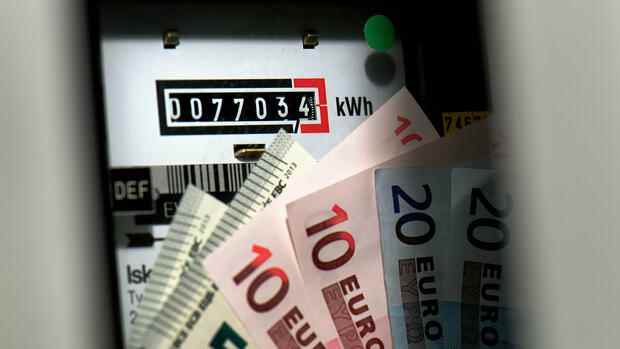The German electricity market is being re-regulated.
(Photo: dpa)
Berlin, Dusseldorf Again and again, hundreds of thousands of electricity customers fall victim to flimsy providers such as Stromio and Immergrün. Now politicians are acting and want to clean up some innovations in the holey Energy Industry Act.
First of all, the Federal Network Agency will have more supervisory powers over energy suppliers: the authority can check the economic performance of every electricity supplier at any time and completely or partially prohibit an energy supplier from carrying out its activities at any time.
This emerges from a draft bill by the Federal Ministry of Economics, which is available to the Handelsblatt. In this way, cases like those of the electricity and gas supplier Stromio should be prevented in the future.
At the end of last year, the Kaarst-based company canceled almost all of its customers’ contracts without warning because the prices for electricity and gas on the exchange had risen so massively that the provider was no longer able to meet its own discounter prices. However, the company has not yet filed for bankruptcy.
Top jobs of the day
Find the best jobs now and
be notified by email.
Countless customers fell into their local replacement supply without warning and ended up with completely overwhelmed public utilities and other basic suppliers. They introduced significantly higher prices for the unplanned new customers because they now also had to procure the energy at expensive exchange electricity prices. However, they did not change the prices for their existing customers. This led to a legal dispute between municipal utilities and consumer advice centers.
The Federal Ministry of Economics now wants to solve this problem as well: If an electricity provider intends to stop supplying a household customer, it must notify the Federal Network Agency three months in advance and also inform the customers affected at an early stage. On the other hand, when it comes to the question of two different tariffs for basic suppliers, politicians take a step towards companies.
>> Read here: Europe in the energy crisis: EU Commission is considering capping electricity prices
Replacement and basic supply are to be separated from each other in the future – also in terms of price. “As a result, the replacement supply prices can take the current procurement costs more into account,” says the draft. However, this should only be possible for a limited time of three months.
The Association of Municipal Companies (VKU), in which the municipal utilities are combined, welcomes the emerging regulation. VKU general manager Ingbert Liebing told the Handelsblatt that the draft law that is currently circulating is going in the right direction.
“If it is decided in this way, it would provide the necessary legal clarity in basic and replacement care. The way of decoupling the replacement and basic supply from each other is the right one,” said Liebing. This gives the basic suppliers the opportunity to adequately deal with short-term challenges in the interests of consumers.
Consumer advocates are not enthusiastic
Mainova had meanwhile charged 79.88 cents per kilowatt hour from new customers in the basic and backup supply at the beginning of January. That is a premium of 175 percent compared to the price of 32.61 cents for existing customers. The supplier justified the decision with the drastically increased exchange electricity prices.
While one megawatt hour of electricity on the spot market (EEX) cost a good 50 euros a year ago, the price has meanwhile shot up to 431 euros in December. It is currently 225 euros per megawatt hour and is therefore still more than three times as expensive as in March 2021.
>> Read here: Here’s how to find a good electricity provider now
Consumer advocates, on the other hand, are not very enthusiastic about the draft bill. More supervisory rights for the Federal Network Agency are an important step, but two different price tariffs for basic and backup supply are considered wrong: “This is still a disadvantage for an entire customer group, even if it only lasts three months,” says energy expert Udo Sieverding from the Consumer Protection Center North Rhine-Westphalia the Handelsblatt.
For this very reason, some consumer advice centers had sued several municipal utilities, but were only partially right in the first instance. The regional courts in Cologne, Leipzig, Berlin, Dortmund and the higher regional court in Cologne decided in favor of the tariff split. The regional courts in Frankfurt, Mannheim and Hanover, on the other hand.
The Stadtwerke defend their actions. “In a special situation, we assigned the additional costs for an unplannable additional energy procurement to where they arose – by passing on these additional costs to the new basic-supplied customers,” said Rheinenergie Sales Director Achim Südmeier after the complaint by the NRW consumer advice center was received.
The district court of Cologne took a similar view and dismissed the application for an injunction against RheinEnergie as “unfounded”. In the meantime, some municipal utilities have already combined their two tariff models again.
More: Eon boss warns of further rising electricity prices for industry and consumers
